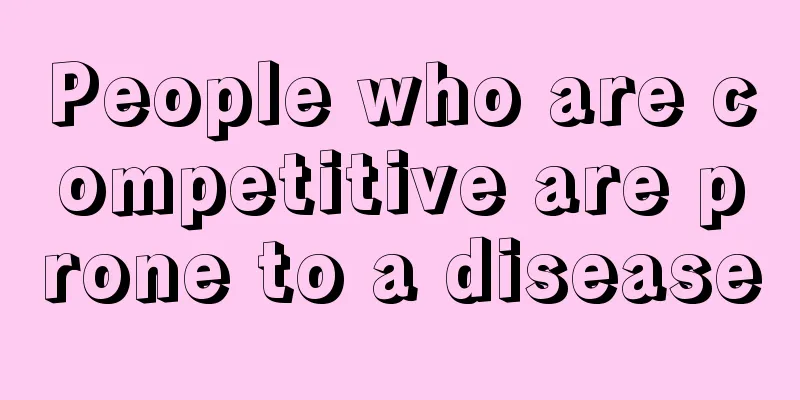What is the best way to prevent liver cancer? Patients with this disease are more likely to develop liver cancer

|
A long time ago, there was a saying on the Internet that cancer can be inherited and even spread in families. This saying actually makes sense. Every family has the same living habits. Bad living habits can cause various diseases and even cancer. Today, let's talk about several types of people who are prone to liver cancer. These three types of people are prone to liver cancer Improper diet Liver cancer is a typical digestive system disease. There is a saying in liver cancer prevention: "Prevent water, prevent food, and prevent liver cancer." This shows the importance of diet for liver cancer. Bad eating habits can damage the digestive system, put a great burden on the liver's detoxification function, and increase the possibility of liver malignancy. In addition to the common expired food, pickled food, high-salt and high-fat food, the most critical is moldy food. For example, peanuts, cotton seeds, walnuts, almonds, hazelnuts, dairy products and other foods that are prone to mold contain aflatoxin, which has a carcinogenicity that is 70 times that of dimethylnitrosamine. Hepatitis patients Liver cancer has a "three-step" process: hepatitis - cirrhosis - liver cancer. If chronic hepatitis is not properly treated, it will eventually turn into liver cancer and cause death. A survey shows that more than 85% of liver cancers are caused by hepatitis; and people who have had hepatitis B have a seven to ten times higher chance of developing liver cancer than the average person. In addition, the detection of replication intermediates in liver cancer tissues confirmed that there were traces of HCV replication in liver cancer tumor tissues, and the presence of HCV RNA was also detected in liver cancer tissues. Currently, there are about 170 million chronic hepatitis C patients in the world, and the annual prevalence of hepatitis C-related liver cancer is 4%. 59% of liver cancer is related to hepatitis C virus infection. It can be seen that the impact of chronic hepatitis, in addition to hepatitis B, hepatitis C on liver cancer should not be underestimated. Those with a family history of liver cancer Liver cancer is a typical familial hereditary disease. The most obvious clinical feature of genetic susceptibility to liver cancer is family history, that is, if there are multiple liver cancer patients in several generations of the same family, the family's chance of suffering from liver cancer is higher than that of ordinary families. This is the common phenomenon of familial clustering of liver cancer. Epidemiological surveys have found that in families with a high incidence of liver cancer, the incidence of liver cancer among cohabiting relatives exceeds that among non-cohabiting relatives; the cancer rate among offspring whose fathers have liver cancer is 29.3%, while the cancer rate among offspring whose mothers have liver cancer is 41.7%; and among first-degree relatives, siblings have the highest risk of cancer. Prevent liver cancer from "eating" Experts point out that, in addition to the hepatitis B, C, and D viruses themselves, and the recognized carcinogenic microorganisms, the occurrence of most cancers is related to bad living habits and eating habits. Once the diet often contains carcinogens, it is easier to promote liver cancer. Therefore, Professor Zhang advises people to establish a healthy and reasonable diet structure, develop good eating habits, master some knowledge of diet to prevent cancer, and be careful not to "eat" cancer. Do not eat moldy food Aflatoxin in fungi is a carcinogen. The carcinogenicity of aflatoxin is 75 times stronger than that of the recognized carcinogen nitrosamines. The toxin can induce liver cancer in humans, monkeys, mice, and poultry. The shortest time required for cancer is 24 weeks. To prevent fungal contamination of food, you should pay attention to the following: peanuts, corn, sweet potato chips, rice, millet, etc. stored at home must be dried thoroughly and stored in a dry and ventilated environment. Moldy peanuts, potato chips, radish chips, etc. should be discarded and cannot be eaten by humans, livestock, and poultry. Animal and vegetable oils should not be eaten after they have gone bad Stale oils all contain the chemical component malondialdehyde, which can generate polymers and react with proteins and DNA in the human body, causing the protein structure to mutate, causing the cells with mutated proteins to lose their normal functions and transform into early cancer cells. In addition, malondialdehyde polymers can hinder the replication of DNA and accelerate the aging process of people. Therefore, animal and vegetable oils should not be stored for too long, and oils that have deteriorated and have a rancid smell should not be eaten. Foods fried with rancid oils not only taste bad, but more importantly, they can cause cancer and shorten people's lifespan. No alcohol abuse The degree of damage caused by alcoholic liver disease is closely related to the amount of alcohol consumed daily, the time of drinking, and the way of drinking. Alcohol in the human body needs to be metabolized by the liver, and the acetaldehyde produced by metabolism is extremely toxic to the human body. Long-term and heavy drinking can lead to cell damage, fat deposition in liver cells, inflammation and necrosis of liver cells, and hyperplasia of fibrous connective tissue, which can eventually lead to cirrhosis of the liver, and some cirrhosis of the liver will turn into liver cancer. |
<<: What are the dangers of liver cancer? These liver cancer hazards must be paid attention to
Recommend
What are the labor pains like before giving birth
When a pregnant woman is approaching the delivery...
How long can you live with early stage gallbladder cancer
Although cancer is not as scary as it used to be ...
What color is good for eyes
With the continuous development of science and te...
How much vitamin B is used to prevent mosquitoes
In addition to the hot weather in summer, the arr...
What causes dizziness, tinnitus, fatigue and easy tiredness
Many of our friends have a very fast pace of life...
How to diagnose viral infection in blood routine test
Many people tend to confuse viral infections with...
What does a mole on the lips mean? Is it some kind of disease?
There are many female friends who have moles on t...
What should I do if I have a dry cough
If your throat is dry and itchy, you can improve ...
Treat hemorrhoids and internal hemorrhoids
Hemorrhoids are a very common disease, and they c...
How long does it usually take for brain cancer to go from early stage to late stage
Fever in the late stage may indicate a more serio...
What to do with urine protein allergic purpura
Henoch-Schonlein purpura is very common in clinic...
The correct way to care for patients with bile duct cancer
What is the correct way to care for patients with...
Is surgery necessary for early stage lung cancer?
Currently, surgery is the preferred treatment for...
Are toner and moisturizer the same?
There are many skin care products on the market, ...
How does TCM treat advanced liver cancer?
How does Traditional Chinese Medicine treat advan...









